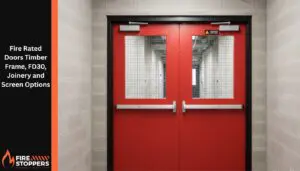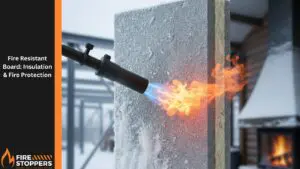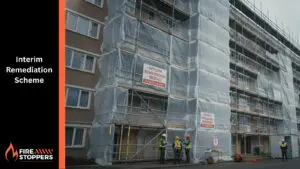Fire Prevention Officers in Dublin and across Ireland play a vital, legally empowered role in keeping businesses, public buildings, and workplaces safe from fire. Their core function is to ensure compliance with Irish fire safety laws and standards, protecting both lives and property through proactive inspection, enforcement, and education.
Statistics from Irish Fire Services consistently highlight fire as a serious risk to business continuity and community safety, with hundreds of workplace fire incidents reported each year. When fire strikes, companies close forever. Insurance doesn’t cover everything. Lives can’t be replaced at any price. Fire prevention officers stand between your business and disaster.
These officers have serious power under Irish law, operating under the Fire Services Act 1981 and the Building Control Acts 1990-2014. They can shut down your premises immediately if they find dangerous conditions. They issue fines that hurt your bottom line. They demand immediate action, and they get it. But here’s what smart business owners know – work with them, and they become your greatest ally in staying safe and compliant.
This comprehensive guide explains everything you need to know about fire prevention officers in Ireland. You’ll learn their duties, understand your obligations, and discover how to stay on the right side of fire safety law. Whether you’re a business owner, property manager, or facilities professional, this information could save your business and protect the people who matter to you.
Duties and Legal Authority of Fire Prevention Officers

Fire prevention officers are specialists who stop fires before they start through comprehensive inspection and enforcement powers. Unlike firefighters who rush to emergencies, these professionals focus on preventing disasters through careful assessment, guidance, and regulatory compliance. In Dublin, the Fire Prevention Section operates as a distinct unit within the Dublin Fire Brigade, led by Senior Executive Fire Prevention Officers who coordinate teams, manage training, and develop fire safety strategy.
Core Duties Include:
Survey and Inspection Powers: Fire Prevention Officers survey existing buildings and those under construction to confirm fire safety regulations are being followed, focusing on all non-domestic premises including offices, apartments, hospitals, and public spaces. They conduct regular and unannounced inspections citywide, examining everything from escape routes to fire safety equipment functionality.
Legal Enforcement Authority: Officers are empowered to enter premises for inspection, demand documentation, issue improvement notices, and require remedial actions. When warranted, they can order immediate shutdown of dangerous premises and enforce compliance through Ireland’s courts. Station officers and assistant fire prevention officers also carry significant powers that can impact your operations immediately.
Building Control Integration: Fire Prevention Officers play an integral role in building control—reviewing plans for new buildings and alterations, ensuring fire safety systems are properly designed and implemented before, during, and after construction. They inspect licensed venues, review fire certification applications, and monitor ongoing compliance with evolving regulations.
Professional Qualifications: These officers hold advanced qualifications—often degrees in engineering, architecture, or surveying. Team members may include ex-firefighters, giving them real-world insight into fire behaviour and evacuation procedures. This technical background enables them to understand complex building systems and spot problems others might miss.
Understanding fire safety compliance requirements is essential for working effectively with fire prevention officers and maintaining safe operations.
How Do Fire Officers Ensure Fire Safety Compliance in Dublin Buildings?
Dublin Fire Brigade takes a systematic approach to fire safety compliance across the city’s diverse building stock. Officers conduct regular inspections of commercial premises, residential buildings, and public facilities. They don’t just tick boxes – they assess real fire risk levels and verify that adequate safety measures are properly installed and maintained.
The compliance process begins with detailed fire risk assessments conducted by qualified officers. These professionals examine building layouts with a critical eye. They check escape routes for obstructions. They test fire safety equipment to ensure it actually works. They review fire safety certificates and building control documentation to verify compliance with current standards. Dublin City Council works closely with Dublin Fire Brigade to ensure nothing falls through the cracks.
When officers find deficiencies, they don’t just point out problems – they provide specific guidance on how to fix them. They establish reasonable timeframes for compliance based on the severity of issues found. However, “reasonable” doesn’t mean indefinite. Miss their deadlines, and enforcement action follows quickly. The smart businesses ask questions early, get advice before problems develop, and maintain ongoing dialogue with officers to stay ahead of compliance issues.
Property managers face unique challenges in maintaining compliance across multiple buildings. Learn more about fire safety compliance for property managers to understand best practices.
What Are the Key Responsibilities of Senior Fire Prevention Officers?

Senior fire prevention officers carry enormous responsibility for public safety across their designated areas. A chief fire officer oversees fire safety standards for entire regions, making decisions that affect thousands of buildings and millions of people. Senior executive fire prevention officers manage teams of specialists and coordinate with other emergency services to ensure comprehensive coverage.
These aren’t desk jobs with limited real-world impact. Senior officers review complex applications for major developments. They sign certificates that allow buildings to open to the public. They make decisions on appeals when building owners disagree with officer recommendations. Every signature, every approval, every decision directly impacts public safety. They also ensure their teams stay current with evolving legislation and maintain the high standards expected of fire safety professionals.
Community fire safety falls under senior officers’ responsibility as well. They coordinate school visits, public safety campaigns, and educational programmes for vulnerable populations. Understanding fire safety for schools helps demonstrate how officers work to protect vulnerable environments. But their biggest responsibility remains clear – ensuring the safety of persons across all types of premises. When you understand that senior officers must live with the consequences of their decisions, you begin to appreciate why they take compliance so seriously.
Irish and Dublin-Specific Fire Safety Context
In Dublin, fire safety is enforced by the Fire Prevention Section of Dublin Fire Brigade, which coordinates community-wide education and training programmes alongside regulatory enforcement. Executive and Assistant Fire Prevention Officers carry out systematic compliance efforts through regular inspections, certification oversight, and emergency response when immediate safety concerns arise.
Irish workplaces must keep pace with evolving regulations, with building owners expected to stay compliant with new standards and undergo ongoing staff safety training. The regulatory environment continues to develop, making proactive engagement with Fire Prevention Officers essential for maintaining compliance and avoiding enforcement action.
Dublin Fire Brigade’s fire prevention section operates independently from emergency response teams, allowing officers to focus entirely on proactive fire safety measures. This separation ensures that prevention work receives dedicated attention while maintaining coordination with operational firefighting capabilities when needed.
Understanding how to conduct a fire drill forms part of the training guidance officers provide to ensure businesses can respond effectively to emergencies.
What Training and Qualifications Do Fire Prevention Officers Need in Ireland?
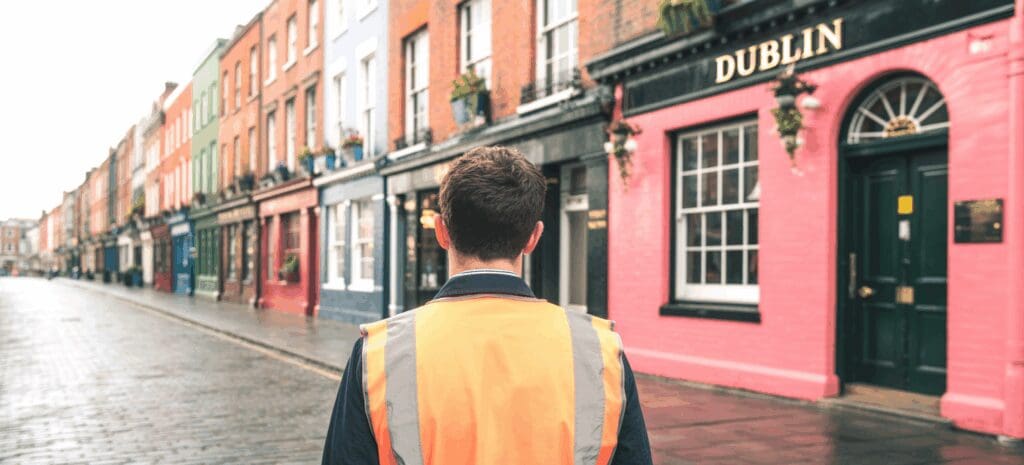
Fire prevention officers must meet demanding qualification requirements that reflect the technical complexity of their role. Most officers need degrees in engineering, architecture or surveying, providing the technical foundation necessary to understand building systems, structural fire protection, and complex fire safety principles. This isn’t just academic knowledge – officers must apply these concepts in real-world situations where lives depend on getting decisions right.
The training pathway often includes practical experience as a firefighter, which provides invaluable operational knowledge. Officers who have fought fires understand how fire behaves in different conditions. They’ve seen firsthand how building design affects evacuation success. This operational experience, combined with technical education, creates professionals who truly understand fire safety from every angle.
Ongoing professional development never stops for fire prevention officers. They must complete regular course training covering new building regulations, updated fire services act requirements, and emerging inspection techniques. Many officers pursue advanced qualifications in fire safety engineering or risk management to enhance their expertise. The combination of formal education, practical experience, and continuous learning ensures officers possess the comprehensive knowledge needed to assess even the most complex fire safety scenarios.
Understanding fire safety regulations in Ireland helps officers stay current with evolving legislation and maintain professional competency.
What Emergency Powers and Enforcement Authority Do Fire Officers Have?
Fire officers possess significant emergency powers under Irish legislation, particularly when immediate fire safety concerns are identified. The Fire Services Act grants them authority to issue prohibition notices when premises pose serious fire risks. This means they can require occupants to evacuate immediately and prevent reoccupation until safety deficiencies are corrected. These aren’t empty threats – officers use these powers when necessary to protect public safety.
In emergency situations, officers can require immediate implementation of safety measures. This might include installing temporary fire safety equipment, modifying operational procedures, or restricting occupancy levels. They can demand additional documentation to demonstrate compliance, and they can inspect premises without advance notice. Refuse to cooperate, and you’ll face formal enforcement proceedings that can result in prosecution and significant penalties.
Officers work with local authority enforcement teams when dealing with persistent non-compliance. When reasonable measures to achieve voluntary compliance fail, they can initiate formal proceedings. Directors can face personal liability for fire safety failures. Courts regularly impose substantial fines on businesses that ignore fire safety requirements. However, officers prefer cooperation over confrontation. Work with them voluntarily, and you’ll find they’re knowledgeable professionals who want to help you achieve compliance efficiently.
Workplace Responsibilities and Compliance Requirements
All business owners, employers, and anyone in control of premises are legally obliged under Irish law to maintain comprehensive fire safety standards. This responsibility extends beyond simple equipment installation to encompass ongoing management, training, and documentation requirements that satisfy Fire Prevention Officer standards.
Legal Obligations Include:
Professional Risk Assessment: Businesses must undertake professional fire risk assessments and maintain clear, up-to-date documentation of all fire safety measures, checks, and procedures. These assessments identify potential fire hazards, evaluate existing safety measures, and recommend improvements that officers expect to see implemented.
Operational Compliance: Companies must keep escape routes unobstructed, fire safety equipment operational, and all staff well-trained in emergency procedures. Fire prevention officers expect to see evidence of ongoing maintenance programmes and regular employee training that demonstrates practical emergency preparedness.
Cooperation and Response: Businesses must cooperate fully with fire authorities during inspections, responding to recommendations or enforcement deadlines to avoid penalties, immediate closure, or prosecution. Officers prefer cooperation over confrontation, but they will take enforcement action when voluntary compliance fails.
Shared Accountability: Owners and those “having control” (including property managers and tenants) share accountability—responsibilities cannot be delegated away and directors can be held personally liable for serious safety breaches. This legal framework ensures that fire safety remains a priority at all levels of business management.
Understanding how to prevent fires in the workplace provides essential guidance for maintaining safe operations that satisfy officer requirements.
What Role Do Fire Officers Play in Building Control and Planning Applications?

Fire officers play an integral role in the building control process, reviewing planning applications and building submissions to ensure fire safety requirements are incorporated from the design stage. The building control acts require consultation with fire services on significant developments, and officers provide detailed technical reviews of proposed fire safety systems, building layouts, and emergency access arrangements.
During application reviews, officers assess whether proposed buildings will provide adequate means of escape for all occupants. They evaluate fire resistance requirements, review proposed fire safety equipment installations, and assess passive fire protection measures. Officers may require modifications to plans or demand additional safety measures before approving applications. This thorough review process helps ensure that new buildings meet current safety standards before construction begins.
Fire officer involvement in planning prevents costly retrofitting of fire safety measures after construction completion. Officers work with architects, engineers, and developers to identify optimal solutions that meet safety requirements while supporting operational needs. Their early involvement in the process significantly enhances fire safety in buildings while minimising disruption to construction schedules. Building owners benefit from this collaborative approach through reduced costs and faster approval processes.
Understanding passive fire protection compliance for new commercial developments helps developers work effectively with officers during the planning process.
How Do Fire Prevention Officers Assess Fire Risk in Different Building Types?
Fire prevention officers employ different assessment methodologies for different building types because each presents unique fire risks and challenges. Commercial office buildings require evaluation of occupant loads, business operations, storage arrangements, and fire safety systems. Officers must consider how quickly fires might spread in modern open-plan offices and whether evacuation systems can handle peak occupancy periods.
Residential buildings present different challenges that require specialised assessment approaches. Officers focus on means of escape, compartmentation effectiveness, and fire safety equipment appropriate to residential occupancy. They pay particular attention to buildings housing vulnerable residents, such as elderly people or individuals with mobility impairments, who may need additional time or assistance during evacuation procedures.
Industrial and warehouse facilities require officers to understand specific process hazards, fire loads, and the unique challenges of protecting large open spaces. Officers must evaluate how different industrial processes might contribute to fire risk and ensure that safety measures match the operational environment. This specialised knowledge enables officers to provide targeted guidance that addresses the real fire safety challenges faced by each type of premise.
Different building types require specific approaches. Learn about fire safety in older apartment blocks and passive fire protection for commercial offices to understand type-specific requirements.
What Ongoing Duties Do Fire Officers Have for Community Fire Safety Education?
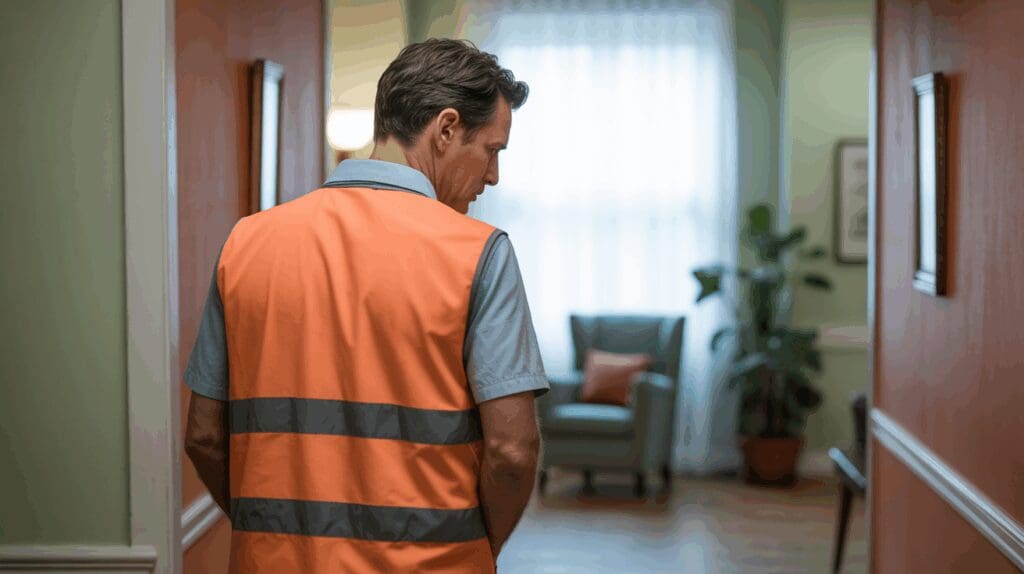
Community fire safety education forms a crucial part of fire prevention officers’ responsibilities, extending their influence beyond regulatory compliance into public education and awareness. Officers regularly conduct fire safety presentations in schools, teaching children about fire prevention and emergency procedures. These educational visits create lasting impressions that children carry home to their families, multiplying the impact of fire safety messages.
Fire officers work with community groups to develop safety campaigns addressing specific risks prevalent in different neighbourhoods. They focus particularly on vulnerable populations, including elderly residents, families with young children, and people living in high-risk housing types. Officers provide practical guidance on fire prevention measures and help residents develop personal emergency evacuation plans appropriate to their specific circumstances.
The community education role also involves collaboration with housing associations, property management companies, and business groups to address broader fire safety challenges. Officers participate in public events, provide expert commentary on fire safety issues, and work with media to promote fire safety awareness. This educational work helps create communities that are more resilient to fire incidents and better prepared to respond effectively when fires do occur.
Healthcare facilities present unique challenges, and officers work closely with these institutions. Understanding fire safety in Irish care homes and passive fire protection for Irish hospitals demonstrates the specialised approaches officers use for vulnerable populations.
Ready to Ensure Your Fire Safety Compliance?
Fire safety compliance isn’t optional – it’s a legal requirement that protects lives and businesses. Fire prevention officers have real authority to enforce these requirements, but they’d rather help you achieve compliance than prosecute you for failures. Working with officers proactively demonstrates your commitment to safety and often results in better outcomes for everyone involved.
Professional fire safety advice can save you time, money, and stress while keeping you compliant with current requirements. Whether you need a comprehensive fire risk assessment, guidance on specific compliance issues, or help preparing for officer inspections, expert support makes the process smoother and more effective. Don’t wait for problems to develop – take action now to protect your business and the people who depend on you.
Understanding fire safety liability helps business owners appreciate their legal responsibilities and the importance of working with qualified professionals.
Key Points for Fire Safety Compliance
Professional Authority: Fire Prevention Officers are highly qualified, legal authorities empowered to enforce rigorous fire safety standards across all workplace and public premises. Their degree-level qualifications in technical disciplines, combined with operational experience, provide the expertise needed to assess complex fire safety scenarios.
Legal Responsibility: Legal responsibility for fire safety rests with anyone in control of premises, requiring regular risk assessments, documented procedures, comprehensive staff training, and ongoing equipment maintenance. This accountability cannot be delegated and extends to directors who may face personal liability.
Immediate Enforcement: Immediate enforcement action—including fines, business closure, and legal proceedings—can follow non-compliance. Officers possess significant emergency powers including prohibition notices that can shut down operations until safety deficiencies are corrected.
Proactive Approach: Dublin’s Fire Prevention Section leads systematic, proactive compliance efforts via regular inspections, certification oversight, emergency powers, and public education programmes that benefit the entire community.
Ongoing Compliance: Irish workplaces must maintain current compliance with evolving fire safety regulations, making ongoing dialogue with Fire Prevention Officers essential for business continuity and public safety.
For comprehensive guidance on maintaining compliance and understanding your obligations, explore fire safety management strategies that align with officer expectations and regulatory requirements.
Related Topics
- How do fire prevention officers in Ireland influence building design early on
- What are the latest statistics on fire safety compliance in Irish businesses
- How does Irish legislation empower fire prevention officers during inspections
- What common fire risks are identified in Irish commercial buildings today
- How can Irish businesses proactively work with fire prevention officers to avoid penalties

